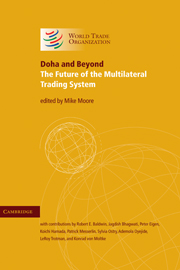Book contents
- Frontmatter
- Contents
- List of contributors
- Introduction
- 1 Trade and sustainable development in the Doha Round
- 2 The WTO: the institutional contradictions
- 3 China's entry into the WTO and its impact on the global economic system
- 4 Key challenges facing the WTO
- 5 Development dimensions in multilateral trade negotiations
- 6 External transparency: the policy process at the national level of the two-level game
- 7 Trading for development: how to assist poor countries
- 8 Controlling corruption: a key to development-oriented trade
- 9 The impact of EC enlargement on the WTO
- Index
- References
9 - The impact of EC enlargement on the WTO
Published online by Cambridge University Press: 05 August 2012
- Frontmatter
- Contents
- List of contributors
- Introduction
- 1 Trade and sustainable development in the Doha Round
- 2 The WTO: the institutional contradictions
- 3 China's entry into the WTO and its impact on the global economic system
- 4 Key challenges facing the WTO
- 5 Development dimensions in multilateral trade negotiations
- 6 External transparency: the policy process at the national level of the two-level game
- 7 Trading for development: how to assist poor countries
- 8 Controlling corruption: a key to development-oriented trade
- 9 The impact of EC enlargement on the WTO
- Index
- References
Summary
Introduction
The enlargement of the existing European Community (EC15) will lead to the largest-ever consolidation of preferential trade agreements (PTAs) since the creation of the GATT in 1947. It will involve ten Central European countries (CECs), and almost half of the 141 PTAs notified to the World Trade Organization (WTO, the GATT successor) and in force will disappear. This large-scale consolidation of European PTAs will restore WTO supremacy in a very significant way. It is important to note that this evolution is fair in the end for WTO and GATT because successive GATT Rounds have profoundly contributed to intra-EC liberalization by inducing the EC to lower its MFN tariffs as well as its internal tariffs – hence reducing the risks and the magnitude of PTA-related inefficiency costs for EC member states.
However, this large-scale consolidation requires three words of caution. First, all the above EC-related PTAs will not disappear all of a sudden. The timing of CECs' accession to EC15 is not clear yet, and the Doha Round may be concluded well before most accessions. Almost all CECs' accessions will be a lengthy progressive process because of the unusually large (by EC15 standards) differences in levels of development between the EC15 and the various CECs. (This was the case, but to a smaller extent both in terms of development differentials and relative population sizes, with Greece, Portugal, and Spain which benefited from long transition periods, particularly in agriculture.
- Type
- Chapter
- Information
- Doha and BeyondThe Future of the Multilateral Trading System, pp. 146 - 177Publisher: Cambridge University PressPrint publication year: 2004



